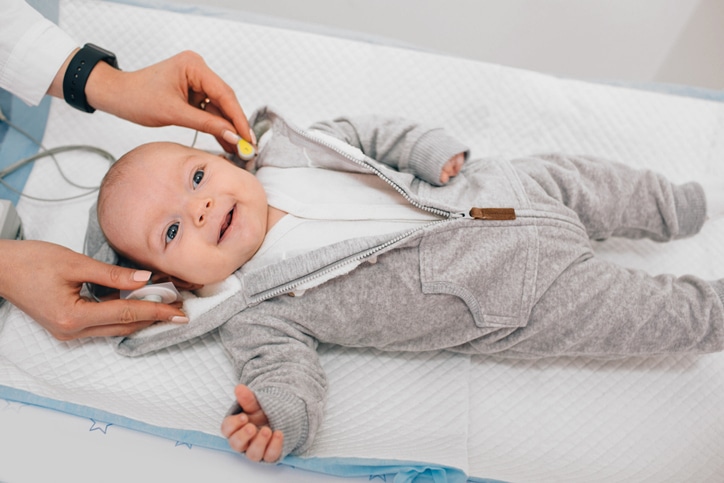What Do You Do if Your Baby Doesn’t Pass the Newborn Hearing Screening?
Step 1: Diagnostic testing with a Pediatric Audiologist
Diagnostic testing should be completed before your baby is 3 months old. All testing can be attempted while your baby sleeps naturally, as it is important that your baby is quiet and still for both Otoacoustic Emissions (OAE) and Auditory Brainstem Response (ABR) testing. Our pediatric audiologist will conduct these tests to determine whether your baby has a hearing problem and if so, identify the type and severity of that problem.

It is VERY important to complete diagnostic testing if your baby doesn’t pass the newborn hearing screening because it is the best way to be SURE about your baby’s hearing.
To schedule your baby’s diagnostic testing with one of our pediatric audiologists, call 859-268-4545. Click the link below for strategies to be prepare and prepare your baby for testing.
What tests are used for diagnostic testing?
As children grow, different hearing tests will be used.
Birth to 6 Months of Age
Auditory brainstem response (ABR) testing is the best test available for newborns and infants up to 6 months of age that can provide information about the softest level of sound the ear can hear.
ABR testing gives information about the amount of hearing loss that is present at different pitches. This is also known as “Frequency-Specific ABR”. For babies up to five months of age, ABR testing can be attempted while a baby is sleeping naturally.
Sounds are played to the baby’s ears and band-aid-like electrodes are placed on the baby’s head to detect responses. Sounds are presented to the ears using small earphones. The electrodes pick up responses from the hearing nerve and a computer measures the responses to identify babies who have a hearing loss.
Infants and Toddlers (6 months – 2 years)
Visual Reinforcement Audiometry (VRA) tests provide information about a child’s hearing in both ears across different pitches. Sounds are presented through earphones or a loudspeaker and the child responds by looking at animated toys or videos that are paired with the sounds. Test results are graphed on an audiogram.
Young Children and Preschoolers (2 – 5 years)
Conditioned Play Audiometry (CPA) tests provide information about a child’s hearing across pitches in both ears. With this technique, the children perform a game-like activity every time a sound is heard. For example, the child is prompted to drop a block in a bucket when a sound is heard. Sounds are usually presented through earphones and results are graphed on an audiogram.
Hearing Tests for Children of All Ages
In addition to the tests already explained, other tests may be used at all ages:
Tympanometry
Tympanometry tests how the eardrum and middle ear are working. This test is important because fluid or other problems in the middle ear can affect hearing. During tympanometry, a small earphone is placed in the ear canal and air pressure is gently changed. A tympanogram is a graph of the test results
Tympanograms help identify the following:
- Fluid present in the middle ear
- Holes in the eardrum
- Eustachian tube problems
- Presence and function of pressure equalization or tympanostomy tubes
If the tympanogram is not normal, babies or young children may be referred to their doctor for medical treatment.
Diagnostic Otoacoustic Emissions (OAEs)
Diagnostic Otoacoustic Emissions (OAEs) are usually used with ABR and hearing test results.
- A small earphone is placed in the ear and tones are presented.
- The microphone measures an echo response from the inner ear.
- This information helps determine if a hearing loss is present when the child cannot be tested using VRA or CPA.
Can a Baby Pass the Test and Still Have Hearing Loss?
Sometimes babies can pass a hearing test and still have hearing loss. Some mild hearing loss that affects only some pitches may not be picked up by the screening test.
Infant Hearing Loss Developing After Birth
Some infants have hearing loss that is not present at birth. These babies are born with normal hearing, but develop a hearing loss later due to accident, use of certain medications, illness or genetics. Regardless of your baby’s age, there are safe and accurate tests that can be used to measure how your baby hears.
If your baby has risk factors for a later-occurring hearing loss or if you have concerns about your child’s responses to sound or his or her speech development, you should discuss this with your baby’s doctor.
Call The Hearing & Speech Center at (859) 268-4545 for more information or to schedule an appointment.